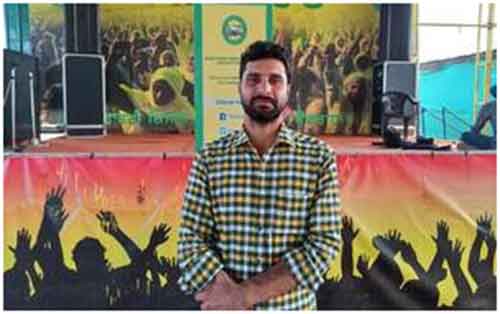
Recently on November 18th a most inspiring talk was delivered at the Jawaharlal Nehru University campus by Surkh Leeh editor and BKU(Ugrahan) coordinator Pavel Kussa.In recent months he has written many an article in punjabi newspapers exposing the neo fascist agenda and economic policies of the ruling party in most analytical fashion. I recommend every democrat to listen to his JNU speech on youtube.No Punjabi paper has sharpened the cutting edge of revolutionary democratic struggle of farmers as the Surkh Leeh.In this speech Pavel touches all the important aspects of the movement ,in a most methodical and illustrative fashion. Most coherently he formulates the factors of the success and further challenges. I recommend readers to read all the interviews and articles of Pavel, which are most lucid and informative.
Pavel Kussa in his introduction narrated how the agitation was not only about the aspects of, Minimum support price, land reforms, electricity etc but also about labour courts dalit questions, women’s aspect etc.
Pavel classified three categories into which the farmer’s frustrations were channelized. The first one belonged to the group of Hindutva criminalization and pro-Modi,the 2nd resorted to suicides, the 3d relentlessly waged the battle to confront the neo-fascist BJP.He expressed how the phenomena of Saffron fascism was confronted at the very grassroots.
Pavel related how mercilessly land was seized by the corporate, landlords and jagirdars with the collaboration of moneylenders .He revealed that 32 percent of Punjab’s population constituted landless dalits and how 70 percent of the landed peasantry in the last 3 decades have turned landless.
In his view the first achievement of the one year struggle was the scrapping of the farmer bills. It was significant that it united the democratic forces of the whole nation, involving all the basic classes, projecting secular politics. Maintaining a secular colour refuting all communal trends, was most commendable. Leaving no stones unturned he glorified the manner the farmers thwarted the poisonous fangs of Hindutva criminalisation, from dividing it and the scale to which they gave a moral blow.
The 2nd achievement was polarization was created at an unprecedented level between the corporates and the farmers. Farmer’s resistance reached a new height in the current agitation. embarrassing the corporate and ruling classs in their very backyard. .He narrated how the seeds of such resistance were sown in the struggles waged by the farmers of Punjab in the last 3 decades, and also in the pre-1946 period. The issues of usury, scrapping of debts and confronting land capture were initiated in a most sustained manner.Pavel touched upon the instances when farmers overpowered the mighty corporates like in Gobindpura
Pavel stated that it was vital that Ruling class politicians must be cut at the very base, which diffused mass movements. In his view no politician or political party must be allowed to seize the stage to rob or divert movements .Almost every politician today was not genuine according to him. Pavel recounted how in many an instance an ongoing movement was derailed as a consequence of political parties capturing it and diverting them to parliamentary path. In depth he elaborated how parliament was an obstacle or illusion for genuine resistance movements and how the present movement taught invaluable lessons in this light. He suggested that till the last tooth the people should confront such trends.
He pointed out how the farmers of Haryana and Western Uttar Pradesh faced similar problems and it was not a problem of Punjab alone. Still Pavel expressed that it was the Punjab farmers who formed the fulcrum of the movement.
Pavel commented on how an analysis must be made of the co-relation of the new economic policies and reforms with the agrarian crisis. After this analysis a total plan of resistance must be chalked out. He recommended that a strategy in the form of a united programme or platform be devised to intervene in all the basic economic issues of the workers, peasant agricultural labourers, youth.
Pavel recounted the glorious eras of the youth and student movement in Punjab in the 1970’sand 80’s and expressed that it should be resurrected in accordance with the situation prevailing today. Very firmly he asserted that the students should repeat history and play a vanguard role in leading the farmers and workers.
I complement the most positive and analytical reflection of Pavel.However I feel he could have explained in further detail the manner landlordism or semi-feudalism operated in Punjab, with such deep penetration of capitalism and imperialism. I also wish he dealt with how this movement confronted the ascendancy of Hindutva Neo-fascism and centre -state relations, or contradiction within the ruling class camp. Arguably he could also have probed deeper into the factor of caste polarization and the weakness of sufficient integration of dalit agricultural labour.
Harsh Thakor is a freelance journalist. Toured India, particularly Punjab .Written on Mass movements
Related posts:
Related posts:
Views: 0
 RSS Feed
RSS Feed

















 December 4th, 2021
December 4th, 2021  Awake Goy
Awake Goy  Posted in
Posted in  Tags:
Tags: 
















